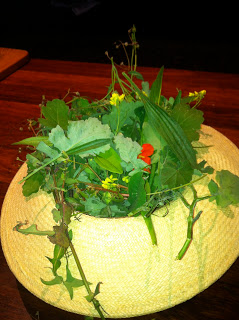Last Saturday morning my husband
went with a group of people to forage. They each paid twenty dollars to a man who knows about these
things and went off in search of edible plants, the sort that grow out in the open and are commonly thought of as weeds.
went with a group of people to forage. They each paid twenty dollars to a man who knows about these
things and went off in search of edible plants, the sort that grow out in the open and are commonly thought of as weeds.
Some folk lasted the two hours plus of searching while one or two fell away during the course of the morning, though not my husband. Never my husband. He is a man who loves the adventure of
finding useful things, especially things we can eat. I say this with the
utmost admiration.
finding useful things, especially things we can eat. I say this with the
utmost admiration.
When my husband came home with his list of
names for the edible plants he had found, along with a few samples for
tasting, his joy was
infectious. For me the names
themselves evoked a writer’s thrill.
names for the edible plants he had found, along with a few samples for
tasting, his joy was
infectious. For me the names
themselves evoked a writer’s thrill.
How can I use such names in my writing? Here I can only offer a list. Among other things, my husband found wild lettuce –
straightforward enough; amaranth – four samples; edible blackberry; nightshade;
stinging nettle; mallow; ten varieties of wild Brassica; river mint; and my
favourite of all, fat hen.
straightforward enough; amaranth – four samples; edible blackberry; nightshade;
stinging nettle; mallow; ten varieties of wild Brassica; river mint; and my
favourite of all, fat hen.
My husband’s hat filled with other edible delights he found locally at Gardiner’s Creek.
On the other side of his
handwritten list, which he had tallied up on the back of the morning program, my husband included clover; opium lettuce; prickly lettuce, wild cabbage; plantain and
milk thistle. He added something
called cleevers, shepherd’s purse, sticky weed and purslane. He also listed flea
bane for dogs. If only he had brought some of that home for our dog. And finally he included dock.
handwritten list, which he had tallied up on the back of the morning program, my husband included clover; opium lettuce; prickly lettuce, wild cabbage; plantain and
milk thistle. He added something
called cleevers, shepherd’s purse, sticky weed and purslane. He also listed flea
bane for dogs. If only he had brought some of that home for our dog. And finally he included dock.
Who would have thought all that food is freely available down by the Merri creek or in any other vacant
allotment where land has been left to go to seed.
allotment where land has been left to go to seed.
When land is left unattended for long periods, my husband tells me, the plants that spring up tend to be plants from the past – heritage plants – those whose seeds might lie for decades dormant in the soil only to reappear when conditions
might be tough for other plants, but ideal for these hardy specimens.
might be tough for other plants, but ideal for these hardy specimens.
It puts me in mind of writing. Next Sunday I’m off to a non-fiction
writing class under the guidance of Leslie Cannold. I need to do something in the direction of turning my thesis
into a book and I figure a new voice, some new input, might well get me started.
writing class under the guidance of Leslie Cannold. I need to do something in the direction of turning my thesis
into a book and I figure a new voice, some new input, might well get me started.
It’s not true that I have not
started. I have written most of
it, but maybe I’m in need of some of these old hardy plants that come out in
times of want. The manicured stuff
seems stale now, like an over attended garden filled with exotics and pruned trees.
started. I have written most of
it, but maybe I’m in need of some of these old hardy plants that come out in
times of want. The manicured stuff
seems stale now, like an over attended garden filled with exotics and pruned trees.
I prefer natives and
I prefer a degree of disorder, a country garden where you can never be sure
what you might find around the next corner.
I prefer a degree of disorder, a country garden where you can never be sure
what you might find around the next corner.

